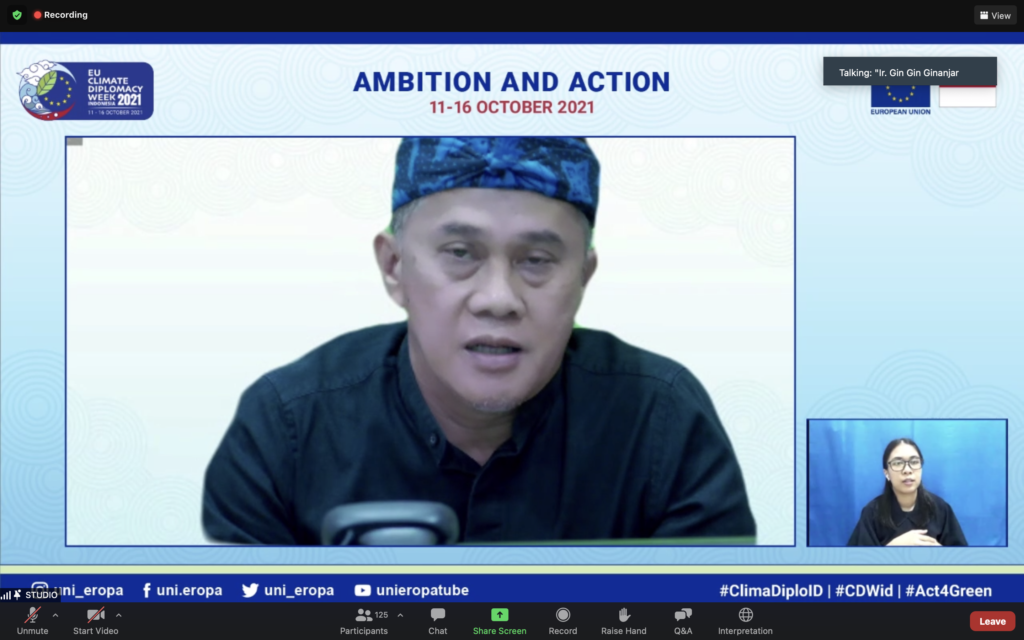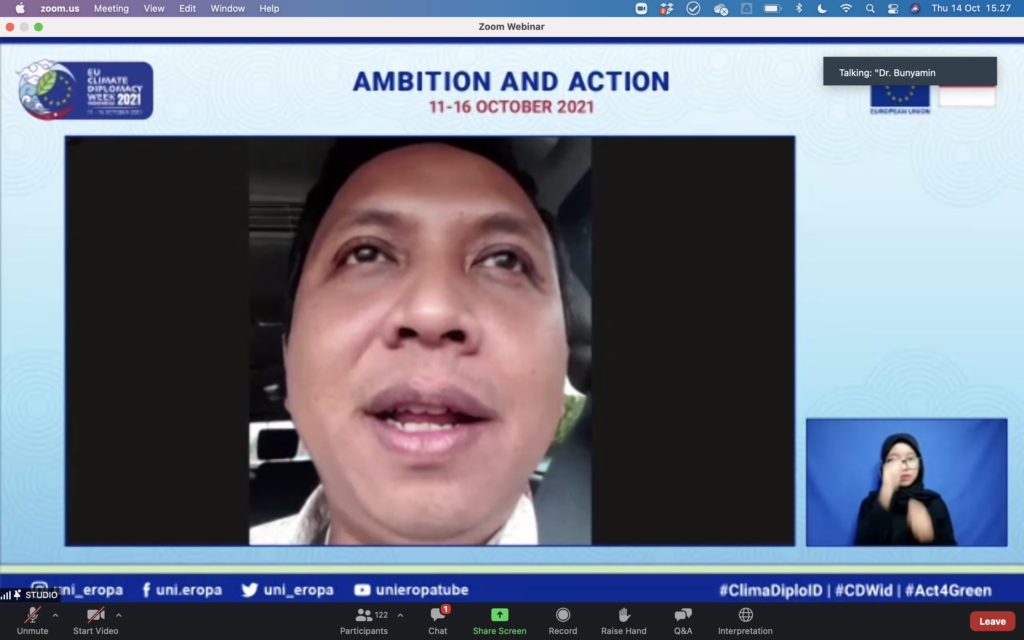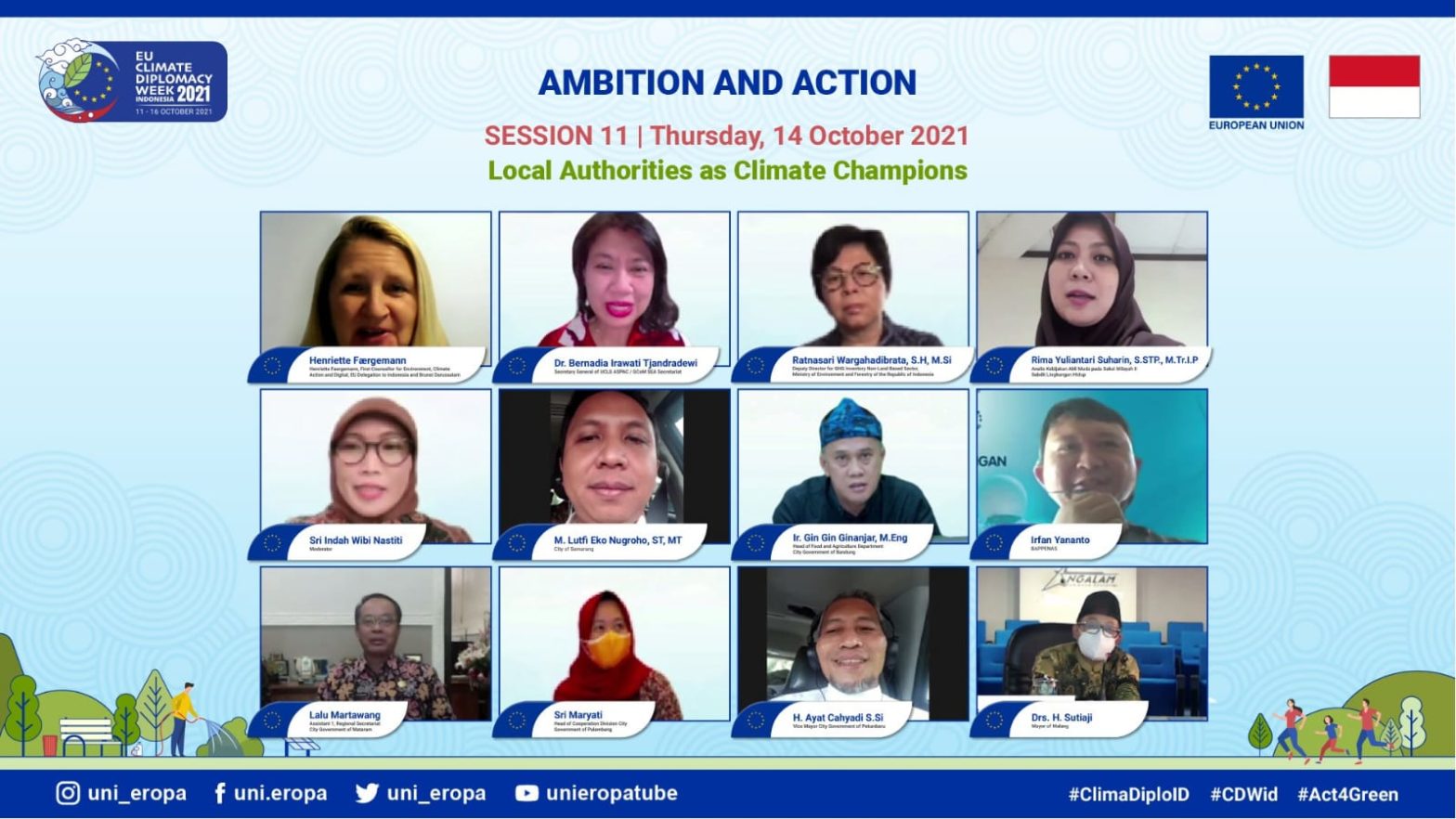From 11 to 16 October 2021, the European Union in Indonesia hosted the “EU Climate Diplomacy Week in Indonesia 2021” to foster dialogue on climate change, showcase success stories and inspire further action. The event included conferences, citizens’ debates and other outreach activities, bringing together communities and a wide range of stakeholders.
The IURC took part in the thematic session titled “Local Authorities as Climate Champions” on 14 October, which aimed to showcase three programmes of the European Union (EU) on cities in Indonesia, namely the IURC, the Climate Resilient and Inclusive Cities (CRIC), and the Global Covenant of Mayors for Climate and Energy (GCoM). The webinar presented urban climate actions from various Indonesian cities engaged with the three EU programmes, including two IURC pilot cities: Semarang and Bandung. Under the IURC framework, Semarang City will be paired with Sofia of Bulgaria to work on urban mobility, while Bandung City will be paired with Rome of Italy to exchange best practices in urban food.
The event was opened by Henriette Færgemann, First Counsellor – Environment, Climate Action, ICT at the Delegation of the European Union to Indonesia. She emphasised the city’s contribution to the global energy-related CO2 emissions; at the same time, it was unfortunate that many cities lacked the resources to develop a strategic framework for measuring, planning, and monitoring the reduction of CO2 emissions and adapting to climate impacts. Next, she introduced the IURC programme and highlighted IURC activities with Indonesian cities. She further noted the benefits of the programme for cities in implementing sustainable urban development and innovation actions.
The first session brought up three Indonesian ministries, namely the Ministry of Environment and Forestry (KLHK), the National Development Planning Agency (Bappenas), and the Ministry of Home Affairs (MoHA). They laid out the strength of the national framework to support urban transformation, fostering low-carbon resilient and inclusive cities.
The second session focused on the voice from Indonesian cities to present their remarkable work in urban climate actions. Semarang City, represented by M. Luthfi Eko Nugroho of the Planning Development Agency, showcased its effort to improve urban mobility as part of its commitment to reduce CO2 emissions. The stationary energy sector has continued to be the dominant source of Semarang’s GHG emissions since 2016, accounting for 51% of net emissions, while the transportation sector contributed 33% of the emission (without LULUCF). Despite the trend towards increasing emissions, opportunities existed for low-carbon urban transport development in Semarang. Among them was the development of an integrated sustainable Bus Rapid Transit (BRT) system. In 2018, Semarang City received support from Green Climate Fund (GCF) for the project preparation to develop the infrastructure of the BRT system and integration with other transportation systems, including no-motorised transport. He shared their journey on how to receive the funding, hoping that it would inspire other cities.


Bandung City, represented by Mr. Gin Gin Ginanjar of the Food Security and Agriculture Department, expressed its commitment to mitigate the effect of climate change and enhance resilience to climate change through the various urban food initiatives.
Reducing food dependency became a new spirit for Bandung City to support family and community food security through the development and urban agriculture empowerment (urban farming) on unproductive land. Bandung City actively raised community awareness on the sustainable diet. They initiated the movement to avoid food waste through a “food sharing” programme that involves different stakeholders. Mr. Gin Gin highlighted that the circular economy model touched all of the urban food initiatives in Bandung City. Bandung was the first Indonesian city that signed the Milan Urban Food Policy Pact (MUFPP) in 2020. During the webinar, he took the opportunity to invite other cities to join MUFPP in order to encourage a more sustainable urban food system.
Other cities that also spoke on this session were Mataram City, Pekanbaru City, Palembang City, and Malang City.
To followed up the audience’s question during Q&A, Mr. Luthfi of Semarang City explained that the number of passengers had increased from time to time. The BRT management ensured continuous improvement and provided reliable service, e.g., utilisation of mobile apps to access maps and schedules, real-time and fare information.
Mr. Gin Gin of Bandung City responded that the supply and demand of the agricultural products started from the small scale community and increased gradually to the large scale. The number of consumers has increased since the urban farmers could keep the plant and harvesting schedule. He also promoted the “new programme,” which allowed the consumer to pre-order agricultural products and let the urban farmers grew based on the request.
The session was concluded by a summary provided by Dr. Bernadia Irawati Tjandradewi, Secretary General of UCLG ASPAC (GCoM SEA Secretariat). Under the three EU programsme, it was hoping that cities seek more support to improve and scale up their climate actions.
